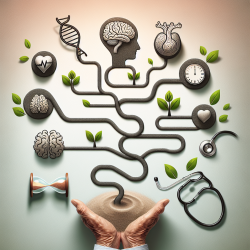Understanding Conversion Disorder in Pediatric Patients
Conversion Disorder (CD) is a complex diagnosis often given when a patient's symptoms do not align with any recognized medical condition. This can be particularly challenging in pediatric patients who present with variable, vague, and multisystem complaints. According to the research article "Problems with diagnosing Conversion Disorder in response to variable and unusual symptoms," there is significant concern about the impact of such diagnoses on young patients.
Challenges in Diagnosing Conversion Disorder
The research highlights that pediatric patients with conditions like Ehlers-Danlos Syndrome (EDS) are at risk of being incorrectly diagnosed with CD. This misdiagnosis can lead to a breakdown in trust between patients and healthcare providers, as well as hinder access to appropriate mental health care. The case of a child with EDS, initially misdiagnosed with CD, illustrates the potential negative consequences of such errors.
Improving Diagnostic Practices
To enhance diagnostic accuracy and patient care, practitioners are encouraged to:
- Familiarize themselves with a broad range of medical conditions that can cause elusive symptoms.
- Consult with other specialists when a clear diagnosis is not apparent.
- Acknowledge the frustration of not having a definitive diagnosis and share this uncertainty with the patient and their family.
- Continue seeking a sound diagnosis and refer patients to more expert specialists as needed.
- Provide mental health support to help patients cope with the stress of having a mysterious condition.
Case Study: Emily's Journey
Emily, a young girl with symptoms consistent with Complex Regional Pain Syndrome and EDS, was initially suspected of having CD. Her symptoms included joint instability and dysautonomia, which were misunderstood by her medical team. Over time, her true medical conditions were recognized, leading to appropriate treatment and improved quality of life.
Conclusion
Diagnosing CD requires careful consideration and should not be a default option when symptoms are difficult to diagnose. Practitioners should remain open-minded and supportive, ensuring that patients receive the comprehensive care they need. Misdiagnosis can have lasting effects on a child's mental and physical health, making it crucial to approach each case with diligence and empathy.
To read the original research paper, please follow this link: Problems with diagnosing Conversion Disorder in response to variable and unusual symptoms.










